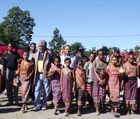Dissemination of Policy of Decentralisation and Local Government in Manufahi District

Prime Minister Xanana Gusmão was in Manufahi district on April 17, 2013 to disseminate the Policy of Decentralisation and Local Government among the local community.
The Head of the Timorese Government explained that “for the municipality of Manufahi to be created there is a need for the population to have the spirit of responsibility as regards State property and that provision of services be more efficient and effective”. In this manner, the Prime Minister added, “we shall be able to comply with the criteria demanded from the municipalities, instead of limiting ourselves to presenting human and natural resources. There must be preparation, a new mentality for this new structure, the birth of a new nationalism and management culture. One must take good care of those goods and property belonging to the State so that the socio-economic development of Manufahi can be supported”.
The Head of the Government called upon the intellectuals of Manufahi to, together with the community leaders, the sub-district administrators, the district Administrator, the veterans, the private sector, the non-governmental organisations, the elderly (Lai-na’in), the women and the youth, identify the potentials of the district. “The potential is tremendous and the soil is fertile, and these are characteristics that may contribute for the establishment of small industriesl and increase production, thereby reducing the imports.”
Kay Rala Xanana Gusmão also asked everybody “to participate in the process of municipalisation in order to improve the lives of the people, a life which, in many aspects, still suffers from many difficulties. To grow the economy, the social and cultural life of the population, and avoid the establishment of major structures that only serve to spend financial resources. I call upon the population of Manufahi to be prepared for this mission which requires the participation of everybody, I ask you to work together in the local production so as to produce those products currently being imported and thereby reduce our dependence from abroad.”
Manufahi district has an area of 1,325 km2 and a population of approximately 54,000 inhabitants. It is composed of four sub-districts (Same, Turiscai, Fatuberliu and Álas) and 29 sucos. The main economic activities are subsistence farming within family businesses, coffee, coconut, rice, maize and manioc, with the potential of economic development in the areas of oil and gas, coffee, new plantations and food collections, rice, and fresh water fishing.










































